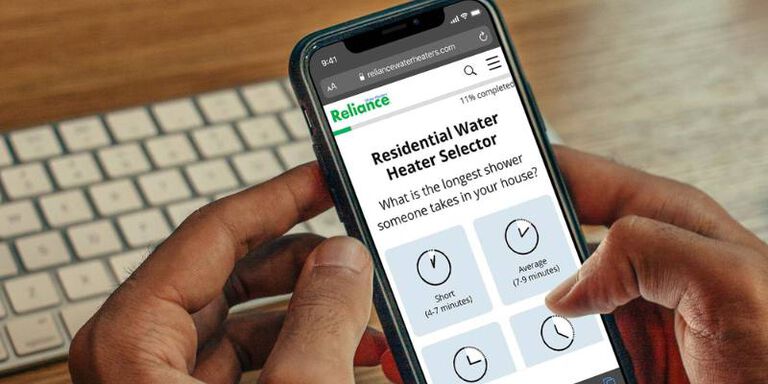
How to Choose a Water Heater: A Buying Guide
Purchasing a water heater is a significant investment that has a huge impact on your home’s efficiency and comfort. No one wants to take a cold shower or deal with the high energy costs that can come with the wrong water heater choice. This guide will help you choose the right water heater, ensuring reliable and cost-effective hot water for your home.
Considerations Before Purchasing a Water Heater
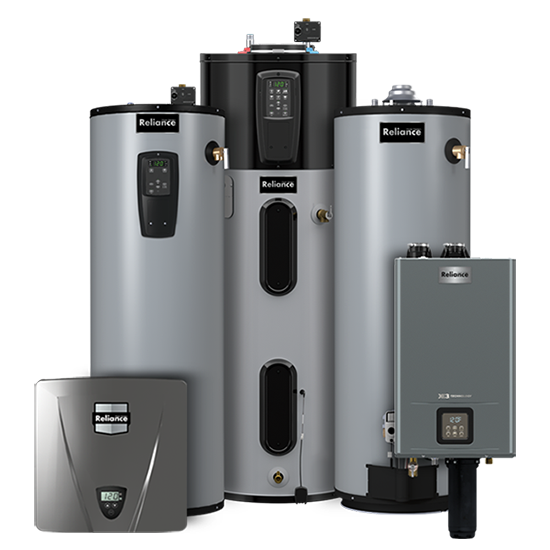
Purchasing a new water heater is an important task in order to ensure there are no unexpected cold showers and to help reduce your monthly energy bill. Aside from energy efficiency, you also want to select a water heater that meets the hot water needs of your home and family. Reliance is here to help take the guesswork and frustration out of the water heater purchasing process.
Think about your household needs when it comes to:
- Fuel source
- Type of heater
- Capacity
- Space requirements
- Water heater size
Water Heater Fuel Types
Water heaters come in the following fuel types: electric, natural gas/propane, and hybrid. Prior to purchasing you’ll have to determine which fuel type your home uses, or determine if you’d like to switch to a different fuel type.
Electric
Electric water heaters are the most common type of residential water heater. Most electric water heaters require a 240-Volt connection. It works by utilizing one or two replaceable heating elements to heat the water from within the tank. Reliance electric water heaters come in many energy-efficient models starting at 10 gallon capacities. The biggest advantage of an electric water heater is the lower up-front cost, but also the easy installation and safer operations. The disadvantages are slower heating times, susceptibility to power outages and overall higher operating costs.
Natural Gas or Propane
Gas water heaters use a burner to heat water, which is a relatively quick heat up process. A gas water heater will require a natural gas or propane connection and more air circulation (venting) space around the water heater, and it should be placed a safe distance from any combustible materials. Reliance gas water heaters come in sizes starting at 30 gallon capacities. While gas water heaters are more expensive to install, their overall operating costs are lower.
Heat Pump or Hybrid Technology
A hybrid electric heat pump is the most energy efficient tank water heater on the market, maximizing savings of up to $600 annually and providing 4x more efficiency than a standard electric tank water heater. A hybrid electric heat pump requires a 240-volt connection. Heat pump water heaters are designed to utilize your home's air to create energy to heat up your water. Reliance hybrid electric heat pumps start at 40 gallon capacities. Even though heat pumps are a more expensive up-front cost they are more energy efficient and have lower operating costs.
Tip
See if you qualify for a heat pump water heater tax credit, rebate, or local incentive program by visiting our Rebate Center.

Find Your Local Retailer
Reliance is sold at numerous neighborhood retail locations throughout the U.S.
Types of Water Heaters
There are many different types of water heaters available, and figuring out which is the best for your home can be an overwhelming process. Reliance is here to make this easy. Read through the following section and use our Water Heater Selector to ensure you'll have hot water daily for your family.
Tank Water Heaters
The most common type of water heater is the tank water heater. They come in electric, electric hybrid heat pump, and natural gas/liquid propane models. A tank water heater is an insulated tank that will heat and store your water until it is needed. A tank water heater comes in flexible sizing which can fit compact spaces, if needed.
Tankless or On-Demand Heaters
Tankless, or on-demand, water heaters don’t store hot water, they heat water as it passes through a series of coils in the water heater. Since the water heater only heats water as you use it, a tankless water heater is usually more energy efficient than a tank water heater. These water heaters come in both gas and electric connections.
A tankless water heater is a good choice for anyone who doesn’t require hot water in more than two places at a time, due to them only providing up to 7.5 gallons of heated water per minute.
A huge benefit of a tankless water heater is their space saving design, and since they do not store hot water, you eliminate the risk of leaky tanks. Tankless water heaters are typically more expensive than tanks in installation and purchasing costs, but will save more money in operating costs.
Point-of-use water heaters (mini tankless) are great for adding hot water to outbuildings, shops, or garages. They are very small and range in sizes from 2.5 gallons to 6 gallons.
Gas Tankless vs. Electric Tankless
Take a closer look at the advantages of each type of tankless water heater.
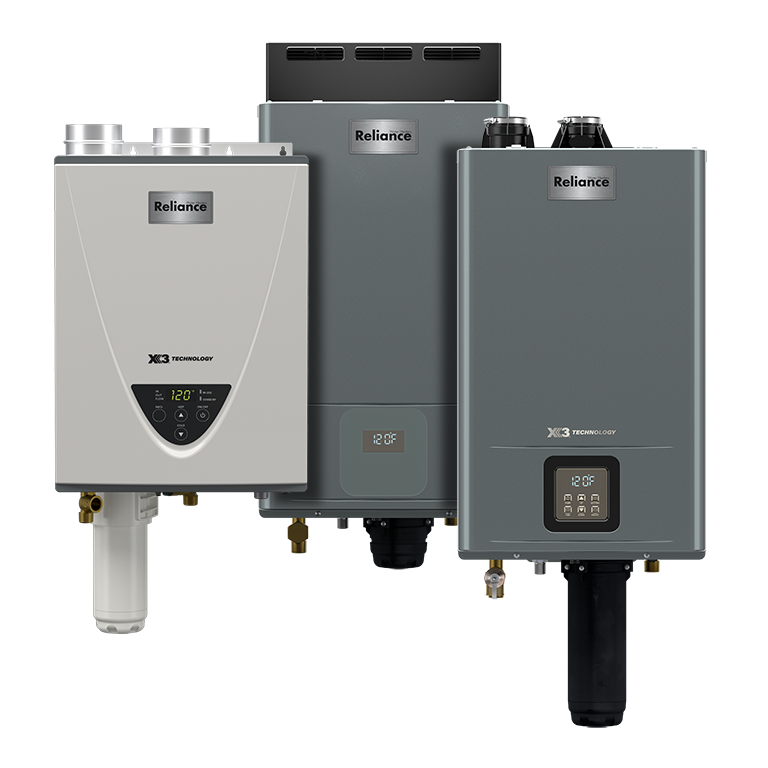
Gas Tankless Water Heaters
- Continuous hot water
- Energy efficient
- Space savings
- Installed indoors or outdoors
- X3® Scale Prevention Technology

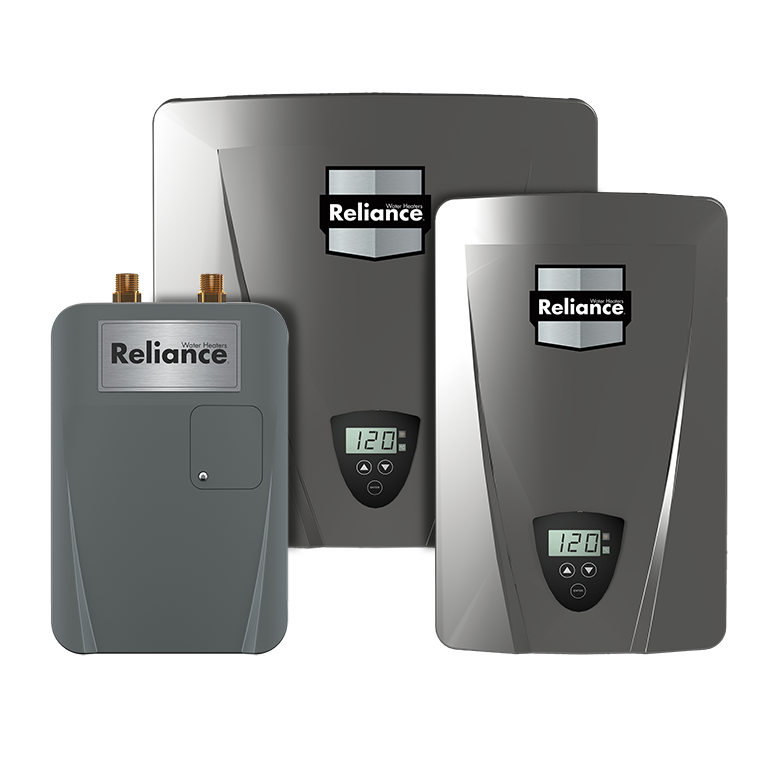
Electric Tankless Water Heaters
- Continuous hot water
- Energy efficient
- Space savings
- Longer life spans
- Less maintenance
Water Heaters for Mobile Homes
Mobile homes require a specific kind of water heater, which must be approved by Housing and Urban Development (HUD). You can purchase both gas and electric water heaters for mobile homes, but if you select gas, be sure to buy the correct type propane or natural gas, inside or outside access for your home.
Check if you need to pick a sealed combustion gas water heater if these units are enclosed with no outside access. When you have outside access, a standard gas water heater style is typically sufficient. Make sure to check your measurements carefully before installation, taking door openings in mobile homes into account due to their smaller-than-average sizing.
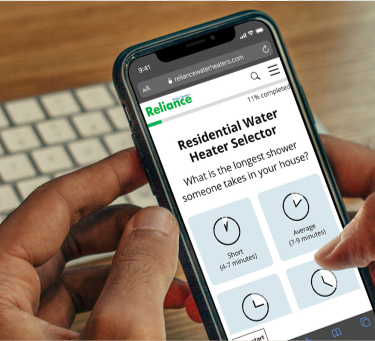
Don't Know What Water Heater To Buy?
Use our Water Heater Selector to find the best model for your family's needs.
Water Heater Accessories
There are many water heater accessories available to improve the safety and efficiency of your water heater.
Expansion Tanks
Expansion tanks hold an additional volume of water that the heater produces when heating cold water in the main tank. These accessories connect to your standard water heater tank through your plumbing.
Water Heater Timers
Water heater timers ensure energy efficiency and money savings by only running your water heater when it’s needed. Wiring a water heater timer into your water heaters electrical supply can ensure your water heater only draws electricity at specified times.
Water Leak Detectors and Alarms
Water leak detectors sit either on the floor or in the pan beside the water heater, sounding an audible alarm that alerts the household that there’s a problem. Some of these alarms are compatible with Wi-Fi and able to send alerts to a smartphone.
Water Heater Insulation Blankets
Blankets that are made to fit over the water heater and strengthens the insulating ability of the tank. Insulating blankets are best for heaters that reside in garages or other unheated spaces.
Drain Pans
Pans that sit under the water heater and collect water from leaks or overflows caused by excess pressure in the tank. The pan has an opening in the side for a drain hose to carry away any overflow water.
Water Heater Stands
Water heater stands raise gas tanks off the ground and reduce the risk of fire in the event that flammable liquid spills nearby. If you’re replacing an old water heater and adding a stand to your new one, this addition affects your measurements, plumbing and venting. Some codes require water heaters to be on stands in garage applications.
Water Heaters With Advanced Technology and Features
Dry-Fire Protection
Available for some electric water heaters, this feature keeps the upper element from burning out if the water heater senses water around it.
ENERGY STAR® Certification and High-Efficiency Ratings
ENERGY STAR® certified water heaters will display the trusted, government-backed symbol for energy efficiency. This rating helps consumers save money while protecting the environment through energy-efficient products and practices.
A high-efficiency water heater not only reduces costs but also benefits the environment. Manufacturers measure water-heating efficiency using an Energy Factor (UEF) rating—the higher the UEF, the more efficient the water heater. While the most efficient models may have a higher upfront cost, they are designed to save money over time.
To compare performance and operating expenses, check the EnergyGuide label. It provides key details on expected efficiency and estimated annual operating costs, helping you make an informed decision when selecting a water heater.
Intuitive Technology
Water heaters with intuitive technology adjust the temperature and other operating features according to your specific needs and use patterns. Benefits of choosing a heater equipped with this kind of responsive technology include better energy efficiency, increased durability and smarter performance.
A Premium Electronic Gas Valve
Certain gas water heaters now feature an electronic gas valve, offering improved reliability and precise temperature control with fewer moving parts than traditional mechanical valves. This advanced design allows for faster hot water recovery and enhanced performance.
An LED indicator confirms when the pilot is lit and provides diagnostic feedback on the water heater’s operation. Self-powered by a thermopile—a device that converts heat into electrical energy—this innovative valve eliminates the need for an external power source, simplifying installation. Additionally, these water heaters can display troubleshooting codes when an issue arises, making diagnostics and repairs more convenient.
Wi-Fi Water Heater Capabilities
A Wi-Fi module is now available in certain electric water heaters that lets you control your water temperature remotely. You can customize your schedule to ensure hot water availability in your water heater tank only when you need it, saving you money on your energy bill. These water heaters also send an alert if your tank is low on hot water.
Frequently Asked Questions?
- Inspect your water heater once or twice a year for loose screws, faulty connections, or visible signs of damage or leaks.
- Flush the tank annually to remove sediment buildup and improve water quality.
- Test the temperature and pressure (T&P) valve to ensure it’s functioning correctly.
- Check the anode rod, replacing it if it shows significant wear.
Manufacturers classify tank water heaters by the amount of water they hold in gallons. To ensure that your household has enough hot water, it’s important to determine how much hot water you need on average. Unless you choose a tankless water heater, you’ll need a larger tank for a larger household.
Another consideration for a tank water heater is the recovery rate, or the number of gallons of water it can heat in an hour while refilling the tank. The greater your demand for hot water, the higher recovery rate you need. This means you also need to consider the number of fixtures or appliances your water heater must support simultaneously.
Use the recommendations below if you are interested in purchasing a tank water heater:
Electric Water Heaters
Family of 1 to 2: 30 gallons
Family of 2 to 3: 40 gallons
Family of 3 to 4: 50 gallons
Family of 5 or More: 80 gallons
Gas Water Heaters
Family of 1 to 2: 30 gallons
Family of 2 to 4: 40 gallons
Family of 5 or More: 50 gallons
If your space can’t accommodate a standard-size water heater, there are alternatives. These options provide the same level of performance as a standard water heater and will work with electric, natural gas or propane systems.
Lowboy and Short Water Heater Space Requirements:
These electric models are shorter and wider than a standard tank water heater. This size of water heater holds the same amount of water as its larger counterparts while fitting in areas with limited headroom, such as crawlspaces and under cabinets. Lowboy water heater sizes can vary between 30 and 49 inches in height and hold up to 50 gallons of water.
Tall Water Heater Space Requirements:
Gas and electric tall water heaters have size ranges from 50 to 76 inches tall and can hold up to 100 gallons of water. They’re ideal for basements or garages where height isn’t an issue. If you choose a hybrid water heater, note that they require extra space to function properly, so be sure to check the manufacturer’s information for proper installation.
While you may be able to install a water heater by yourself, Reliance strongly recommends that you consult a professional plumbing contractor before doing so. Factors such as the proper venting required, managing your home’s fuel line or power source, and removing your old water heater are all reasons to have a local plumber or contractor assist in the installation of your water heater.

Not sure which water heater is right for you?
Use our Buyer’s Guide to choose the correct model for your family’s home.
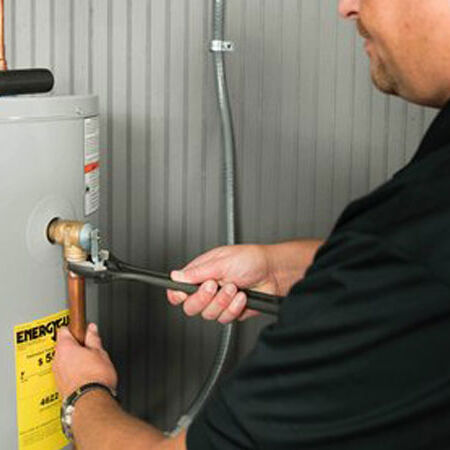
Find Your Neighborhood Retail Store Location
For more than 40 years, Reliance Water Heaters has been committed to delivering dependable water heaters. Order from a trusted retailer near you.
